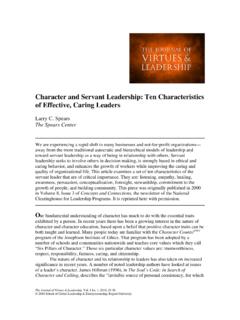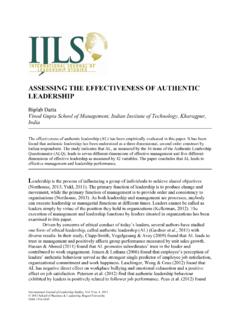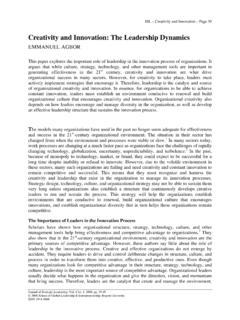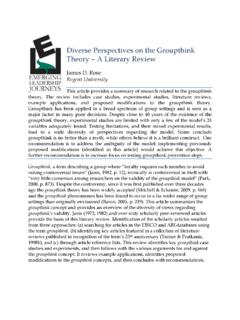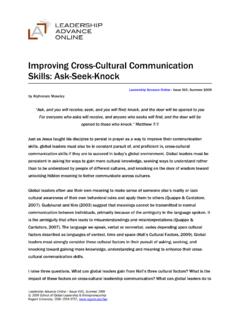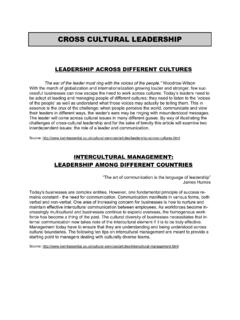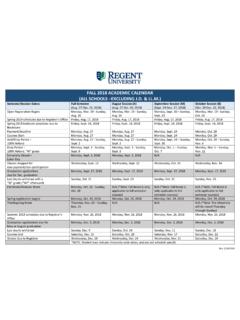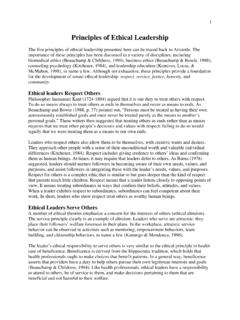Transcription of Mentoring Stages in the Relationship between Barnabas …
1 Mentoring Stages in the Relationship between Barnabas and paul Biblical Perspectives May 2007 Orlando Rivera School of Global leadership & Entrepreneurship regent university The apostle paul was not born an apostle. The apostle paul had a clear understanding that he was called to become an apostle by the will of God, and not as a result of man s selection (1 Corinthians 1:1, Ephesians 1:1). He was transformed from a persecutor of the church (Philippians 3:6) to a devoted minister of Christ to the Gentiles (Roman 15:16) who authored 14 books of the Christian New Testament. Although paul was called to be an apostle by the will of God, his acceptance into the apostolic community came through the sponsorship of an apostle named Barnabas (Acts 9:26-30). This chapter discusses Barnabas s Mentoring Relationship with paul as a significant factor in paul s development into an influential leader in the early Christian church and will also discuss the importance of contemporary leaders forming a Mentoring Relationship with their followers.
2 Barnabas was an early leader in the Christian church through his financial gift to the apostles in Jerusalem (Acts 4:36), his selection as a representative of the Jerusalem church to confirm the work of God in Antioch (Acts 11:22), and the prominent position his name occupies in the list of leaders in the church at Antioch (Acts 13:1). Mentoring is described as a Relationship in which a more experienced manager helps a less experienced prot g (Yukl 404). Barnabas Relationship with paul began when he introduced him to the apostles in Acts 9, but his Mentoring Relationship started in earnest when Barnabas recruited paul to help him teach the new followers of Christ in Antioch (Acts 11:25-26). Barnabas guided paul during his development from a novice follower of Christ to the greatest propagator of the faith in the early church.
3 Senior leaders today can follow the example of Barnabas and contribute to the development of the next generation of leaders. Mentoring Mentoring is often conceived as a strategy to recruit and retain talent in many work and educational environments (Smith and Zsohar). Burgess writes that there are two types of Mentoring , spontaneous Mentoring and planned Mentoring . Spontaneous Mentoring has been around for a long time. Smith & Zsohar posit that positive Mentoring experiences occur when two similar individuals, 2 Mentoring Stages in the Relationship between Barnabas and paul who seem to have the right chemistry, form a Mentoring Relationship which evolves in unstructured ways and takes little organizational effort to keep it going. Formal Mentoring is more challenging because people do not naturally select one another and not everyone is comfortable being a mentor (Smith & Zsohar).
4 Galbraith & Maslin-Ostrowski mention that within the mentorship process, a mentor often assumes multiple roles to bring about the enhancement of the mentee's professional, personal, and psychological development. The Mentoring Relationship is clearly not for everyone. Formal Mentoring programs must take special care to recruit senior leaders who have the desire and ability to serve as mentors in order for positive Mentoring experiences to occur. The Mentoring Relationship between Barnabas and paul worked because they each accepted their roles as mentor and mentee and adapted them as they progressed through the Mentoring process. paul displayed humility by submitting himself in this process. Cohen and Nelson posit that sponsorship includes the concept of subordinating oneself to a senior member of the organization in order to grow and develop within the organization.
5 paul did not use his considerable Jewish pedigree (Philippians 3:5-6) as a reason not to submit to Barnabas overtures to come alongside paul and show him the way in the Christian church. Barnabas plays a role here consistent with his role throughout the book of Acts (Pohill 59). Barnabas encouraged the church in Jerusalem (Acts 4:36-37), encouraged the new believers in Antioch (Acts 11:22), brought paul along to work in Antioch (Acts 11:25-26), accompanied paul on his first missionary journey (Acts 13:2-3), and took on Mark as mentoree when paul refused to continue working with Mark (Acts 11:38-39). This form of Mentoring Relationship was most likely not new to paul . As a Pharisee (Acts 23:6) paul was accustomed to learning from his elders as he developed as a Pharisee (Galatians 1:14). Although he was born in Tarsus in Cilicia, paul spent a considerable amount of time in Jerusalem under the tutelage of Gamaliel in the strict manner of the law of the Jews (Acts 22:3).
6 His primary concern primary concern in the school of Gamaliel was to become as proficient as possible in the ancient traditions in order to advance in Judaism (Bruce). paul experienced a form of the mentor and mentee Relationship at an early age when he was being trained as a leader in Judaism. The most significant aspect of Mentoring in the New Testament is the unique approach to developing leaders Jesus modeled when he taught his twelve disciples. Coleman observes: Jesus had no formal school, no seminaries, no outlined course of study, no periodic membership classes in which he enrolled his followers. None of these highly organized procedures considered so necessary today entered his ministry. Amazing as it may seem, all Jesus did to teach these men his way was to draw them close to himself. He was his own school.
7 Instead of offering formal training like Gamaliel, where students would memorize the written law with its 613 precepts and the oral tradition transmitted by generations of rabbis and preserved by the School of Hillel (Bruce 710), Jesus simply taught his followers to draw close to him. When Peter and John stood before the religious leaders of the day accused of spreading false teaching, they were astonished that uneducated, common men spoke with such boldness. It was then that they recognized that they had been with Jesus (Acts 4:13). Jesus instituted a different way of training Biblical Perspectives May 2007 3 Published by the School of Global leadership & Entrepreneurship, regent university disciples, instead of relying on formal education, he called his disciples to live and learn with him as they went through life.
8 For Jesus Mentoring was a life-style, a Relationship where mentor would impart wisdom to the mentee as they encountered every day challenges. Mentoring was a life-style for Barnabas also. Barnabas guided paul by spending time with him and letting paul observe him interact with new believers at Antioch (Acts 11), church leaders (Acts 13), and non-believers in their first missionary journey. This same Mentoring Relationship can be used by today s leaders to produce similar results in their leadership development programs. Research on Mentoring also reveals two distinct functions mentors provide for prot g s in organizations, psychological acceptance and career facilitation (Kram, Yukl). Kram developed a conceptual Mentoring model based on an intensive biographical research study of 18 relationships in corporate setting. Kram found that individuals entering the adult world of work were likely to encounter a variety of developmental tasks that are reflected in concerns about self, career, and family (608).
9 Mentors, according to Kram, can be valuable in providing mentees psychological support and career enhancement opportunities. In paul s case he did not need psychological support. paul received direct confirmation from Christ that he was chosen to serve God (Galatians 1:12; Acts 9:4-5) and did not need human affirmation in order to fulfill his potential in Christianity. But paul , as a former persecutor of the faith, needed someone to help him begin his career as a recognized and accepted apostle in the early Christian community. It was Barnabas , risking his reputation and position as a church leader, who finally persuaded the disciples to accept paul (Acts 9:27-28). Barnabas served both as a sponsor and mentor for paul and walked him through four Stages of Mentoring : (a) the initiation stage in Antioch Acts 11: 25-26, (b) the cultivation stage during their first missionary journey- Acts 13:4-14-28, (c) the separation stage after a dispute concerning the role of Mark- Acts 15:36-39), (d) the redefinition stage of their Relationship when Barnabas chose to continue his work with Mark and paul partnered with Silas on his next missionary journey Acts 15: 39-41 (Galbraith & Maslin-Ostrowski, Kram, Yukl).
10 Sponsorship Sponsors play a key role in preparing newer employees for success in organizations (Scott). Akande writes that sponsorship is the key to success in the corporate world. Sponsorship is defined as a relational process in which a mentor having credibility and positional or spiritual authority within an organization or network relates to the mentoree not having those resources so as to enable development of the mentoree and the mentoree s influence in the organization (Biehl). paul needed Barnabas to pave the way for him in the network of the disciples much like Joshua needed Moses to place his stamp of approval on him before he could lead the Israelites. Joshua was an assistant to Moses from his youth (Numbers 11:28), but it was only when Moses laid his hands on Joshua that the people accepted him as their next leader (Deuteronomy 34:9).
